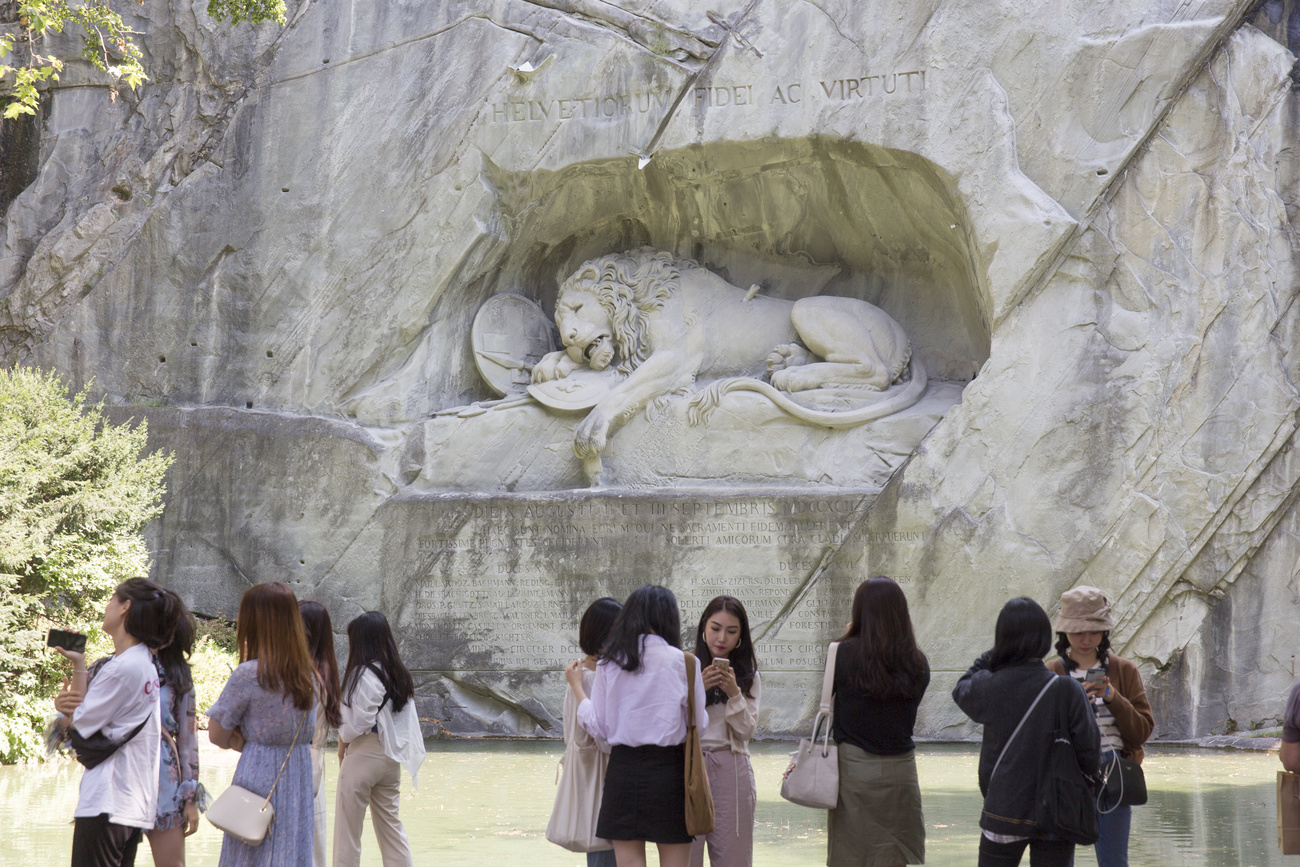Mass tourism in Switzerland: beneficial or detrimental?
Keystone/Anthony Anex
The tourism industry in Switzerland is set to have a good season. Shopkeepers, restaurant owners and hoteliers can expect a welcome boost. However, in tourist hotspots Lucerne, Lauterbrunnen and the Verzasca Valley there are concerns about too many people visiting the region. What are your thoughts on the issue? Join the discussion on “dialogue”.
During the summer months, a fleet of buses carrying tourists from abroad travel across our country. In the canton of Vaud, the director of Glacier 3000, Bernhard Tschannen, is delighted. For him, this clientele provides a safety net. “The advantage with these groups is that the trips are organised and booked in advance, even if the weather isn’t great.”
The city of Lucerne is also one of Switzerland’s top sightseeing destinations, attracting almost seven million tourists a year. A success that irritates many locals, such as Valentin Humbel, president of the Lucerne Young Social Democrats. At the heart of the tension is the Schwanenplatz in the city centre: “Every 70 seconds, a bus pulls up to the square. It’s a lot. I cycle here every day and the busses are really dangerous.”
While the Lucerne authorities are pleased with the financial boost from tourism, this is not the case in Lauterbrunnen. Most visitors only come on day trips to this small village in the canton of Bern. This is the worst possible situation for the municipality, as it has to bear the consequences of mass tourism without really financially benefitting from it.
Swiss public television, RTS, followed a group of Chinese tourists on an express trip across Switzerland:
Solutions to tackle overtourism
Faced with these inconveniences, some popular tourist sites are considering or introducing measures such as parking or entrance charges, or dynamic pricing models for mountain railway tickets.
In the canton of Bern, the small village Iseltwald charges for access to a famous selfie spot on Lake Brienz, and Lauterbrunnen wants to introduce a “valley tax” for cars: the number of cars allowed into the valley would be limited to the number of parking spaces.
More

More
Newsletters
Markus Berger of Switzerland Tourism welcomes these proposals as long as they respect tourists. “Of course, it’s always important that they not only offer relief to the locals and make tourism manageable for them, but that the guests understand them too.”
But will higher prices drive tourists away? Not according to Berger. “Switzerland is a country with high prices. It has always been and will continue to be. This means that Switzerland only appeals to a certain type of guest anyway.”
Listen to the interview with Switzerland Tourism spokesman Markus Berger on Swiss public radio, SRF :
The Verzasca Valley: a special case in Ticino
Every summer, the Verzasca Valley in Ticino is swamped by tourists looking to escape the heat by taking a dip in the river, surrounded by breathtaking scenery. The downside: thousands of cars create traffic jams. This situation has recently caused the local authorities to put up information signs regarding the availability of parking spaces, without ruling out the possibility of introducing a quota for tourists.
Watch the report from Italian-speaking Swiss public television, RSI:
However, this same valley also benefits from a positive aspect of tourism. Over the years, the small village of Corippo has been deserted by its inhabitants. Two years ago, the hamlet was transformed into an Albergo Diffuso, a hotel with rooms set up in empty houses. It’s an original project that, thanks to the tourists, aims to preserve the heritage of the village by revitalising it economically and socially.
Watch the report from Corippo by Swiss public radio, RSI:
Sustainable tourism
In 2024, the tourism and travel industry is expected to reach, or even exceed, pre-pandemic levels.
While the risks of overtourism are a concern, Francisco Betti, co-author of a report on world tourism for the World Economic Forum (WEF), argues in an interview with SWI swissinfo.ch that Switzerland is rather well-equipped to deal with these potential problems. Federalism makes it possible to better manage visitor flows, promote lesser-known destinations and include all stakeholders to ensure that tourism benefits everyone.
Finally, Betti believes that “balancing growth and sustainability is the challenge of the century for the tourism sector”. He points out that other factors can also contribute to more sustainable tourism: technological advances such as sustainable fuels for aviation, hydrogen and electric power, as well as a younger generation that is often more sensitive to environmental and social issues.
Read the interview with Francesco Betti on SWI swissinfo.ch:
More

More
‘Balancing growth and sustainability is the challenge of the century for the tourism sector’
You can answer the following questions on the topic and compare your views with people living in Switzerland and the Swiss Abroad:
Adapted from French by Claire Micallef
